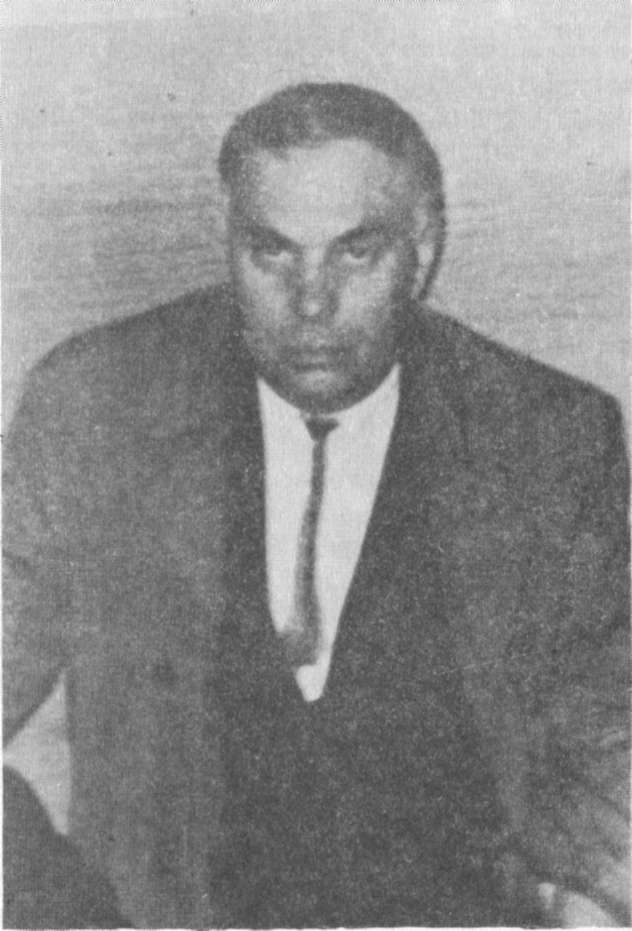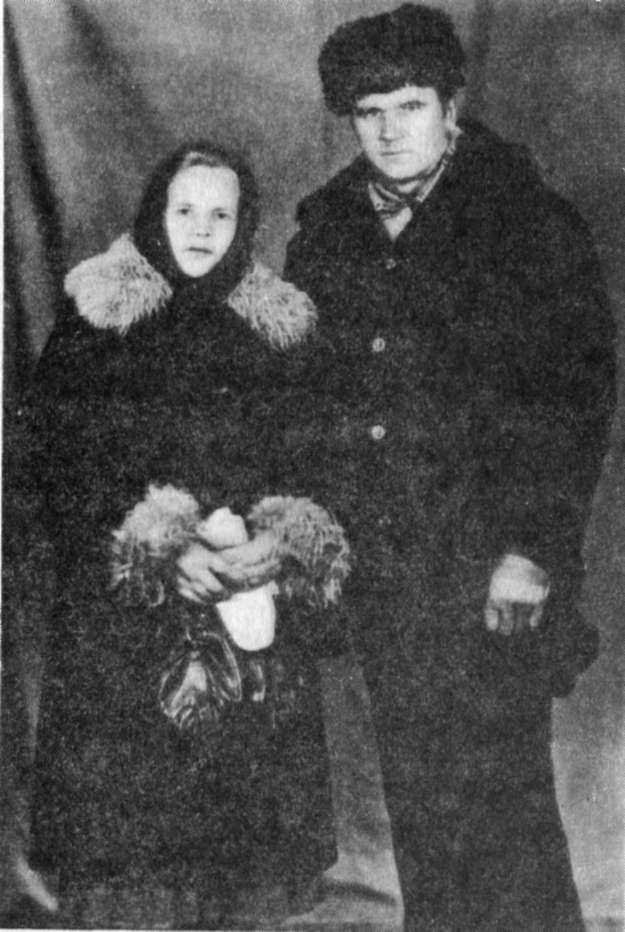Vilnius
July 28 - 31, 1983, many telegrams carrying feast day greetings, addressed to the arrested Father Sigitas Tamkevičius, Pastor of the parish of Kybartai and member of the Catholic Committee for the Defense of Believers' Rights, were sent to the Vilnius KGB from Kybartai, Vilkaviškis, Kapsukas and elsewhere in Lithuania. The

Viktoras Petkus
faithful wished at least with a modest card and a few warm words, to express their love and respect for the priest being held in the KGB Isolation Prison. However, almost all the telegrams were returned to the senders, with a notation, "Addressee Unknown".
This year will make twenty years that Viktoras Petkus is walking the ways of the Gulag Archipelago. On this occasion he writes:
"Even during my youthful years, I found myself right in the gristmill of life, where one is right between the millstones, where one must know something and make a decision, in order to survive. However, the river of life has carried off mountains of details, the anti-climax has come, all that is left is a projection of essence, seeking it and grasping it.
"Thanks to memory, many days from the past stand in the present, like close friends, and at the same time, they are symbolic dimensions expressing the eternity of cultural values and their triumph in the conflict with tyranny world-wide . . .
"A good number of the prisoners brought by hunger to the point of dehumanization, nevertheless do not lose interior freedom of spirit. Nor have they lost the ability to communicate. Moreover, they have not lost hope or faith, without which there can be neither life itself, nor creativity. And perhaps, most important of all, is the fact that even in such a hell, they have not lost the desire to find in the world and in human beings, at least a speck of goodness, love and nobility. They affirmed the power and beauty of unfettered thought.
"... And once again I see the pale and the blue faces, with eyes either extinguished, or brightly burning, only not human beings, but merely combinations of skin and bones, swaying when the wind stirs. They surround me in a tight group. Yes, I sometimes see thein all together. And I cannot understand why I am so bound to something which has long ceased to exist. Why do those gaunt hands stretch out to you, those bony backs still wish to lean against you?
Why do these people not go away, but continue to walk around speaking? Surely, the terrible dilemma of old, 'To be, or not to be?', has not made them immortal for centuries to come?
"There is hardly any food which one can prepare without water. The problem of water: It has continued to haunt us throughout our stay here, for one thing, because the water here is very bad. On its surface floats some sort of grease. For months on end, it is more like cocoa. Hence, it is impossible to drink water without boiling it. Formerly they used to bring clean water from the village, at least for cooking, but then, obviously, someone had the bright idea that after a couple of years, we should have adapted even to swamp water, so we have to eat and drink that liquid.
"Secondly, there is a constant shortage of even such water especially during morning toilette. Moreover, there is a strange problem also with the privies. Nowhere are there water tanks; the water flows in a thin stream through narrow pipes. Hence, it is first necessary to collect a bucket-full, so that it might take the place of a tank. The toilets in all the cells are open to view. The only ventilation is through a single air vent in the cell window. Somewhat earlier in some of the cells, the toilet was separated from the table by a panel, and now, they put up a similar panel in the work rooms, but just on the side toward the door. Never did it enter my mind that I would one day live and work in a toilet room.
"... My spirits are good, I'm more attracted by the heavenly or Divine realm. Only from it arises the life and culture of mankind, Pope John Paul II, in his speech at UNESCO Headquarters in Paris on June 2, a couple of years ago, explained the nature of culture anthropologically as follows: 'Humankind ... is the only object, subject and periphery of culture in the ontological sencse." Culture, in his words, is first of all bound up with the heavenly sphere; with the Divine nucleus, surely we will overcome the natural nucleus, the earthly sphere. Heads up, then! May our gaze be directed toward the Eternal Sun. Hence, I have not felt badly, but daily better and better ..."
August 29, 1983
From the letters of An tanas Terleckas:
At the present time, Antanas Terleckas is in exile, where an attempt is being made to break his will and his convictions. For some time, he was forced to live in the same room with a psychotic, and when he himself became ill, he was not allowed to go to the sanitorium for treatment. Senior Lieutenant S. M. Fedorchenko said, "Do you expect treatment in a sanitorium? You? You've got to be kidding!" His correspondence and visits from relatives are hampered.
" . . .There are so many thoughts in my head, and so many feelings in my heart. However, even in exile, I am forced to censor myself. After all, nothing has changed, the censorship remains the same . . . and I so want you to receive this letter! Just a few words then about my journey into exile. (They took Terleckas from Kuchino Prison into exile, October 27, 1982. — Ed. Note) They tortured me, in the true sense of that word, they tortured me! The camp administration never gave me warm underwear, and they never allowed me to buy any food . . .
"I never thought that there could be prisons worse than that of Smolensk. It seems there can be. For twenty-one days, they kept me in the prison at Irkutsk, what I saw and heard there, you would hardly believe . . .
"In 1958, after a thirty-five kilometer journey by the 'black raven ' they brought me to camp, swollen all over. I thought

Antanas Terleckas in exile, during a visit from his wife, Elena, in Magadan.
that a human being can bear no greater sufferings. Oh, but he can! You can travel by the same 'black raven' along the roads of Kolyma, more than one thousand kilometers. Transported December 23 from Magadan Prison, I thought I would celebrate Christmas Eve in Omsukchan. However, after five hundred kilometers, I stopped over in the prison of Seinchan. It looked as though Christmas Eve would be the saddest. But no! That evening my soul was flooded with such a wave of unlimited happiness, . . .1 felt that I was the most fortunate of all three million Lithuanians ... for that, I thank everyone for their prayers . . .
'I'm very fortunate that fate has sent me here from Lithuania as an ambassador ... I do not plan to seek justice, nor do I plan to complain to anyone . . . They can do everything! It's just that they are powerless to turn me into a slave. At the very worst, they can kill me. Death is not the worst end of a human being . . .
"On November 23, 1980, when I was brought to one of the camps in the Urals, I learned that not long before, they had releases Šerkšnys, who had been a partisan for fifteen years, and had spent the same amout of time in prison. A few years ealier, Simas Kudirka, Petras Plumpa and Šarūnas Žukauskas had been prisoners in this camp. It was very pleasant for me to hear that Lithuanians were supposed to be brave men, prisoners who retained their principles and faithful friends.
"After some time, the Ukrainian who came to Kuchino from another camp made favorable mention of Pečeliūnas and Iešmantas. In the spring, they brought two Ukrainians from the special camp, and much later a Kalmuck. None of them could conceal his pride that his friend had been Henrikas Jaškūnas, that man of great physical strength, who was always able to fight for his convictions. They held a high opinion concerning Balys Gajauskas, who had spent thirty years in prison without breaking.
"One Byelorussian often remembered Vladas Lapienis. He described how Lapienis had stood fast, had been twice put in the punishment cell, and forced the concentration camp administration to back down.
"In the middle of September, 1981, they transported Mikola Rudenko from Mordovia. (When they sentenced his wife, they decided to take the husband further away.) Discovering that I was a Lithuanian, Mikola passed the entire evening telling me about the Lithuanians of the camp in Mordovia: Vladas Lapienis, Petras Paulaitis, Algirdas Žyprė, Vytautas Skuodis and Anastazas Janulis, Mikola is worthy of the highest compliments, but he spoke of the Lithuanians without disguising his admiration . . .
"Mikola told how Taras Shevchenko had brought up the idea of a union between Lithuania and Ukraine. Recalling this idea, it is necessary today for us to know and understand one another. Mikola ended our conversation with the following words, "Your nation is a nation of heroes. You have the moral right to be proud of it' It had been a long time since I felt so happy. Thanks to all of you for that! Your example was very necessary for me on my journey to Kolyma. Today, I still draw strength from it.
April 7, 1983





